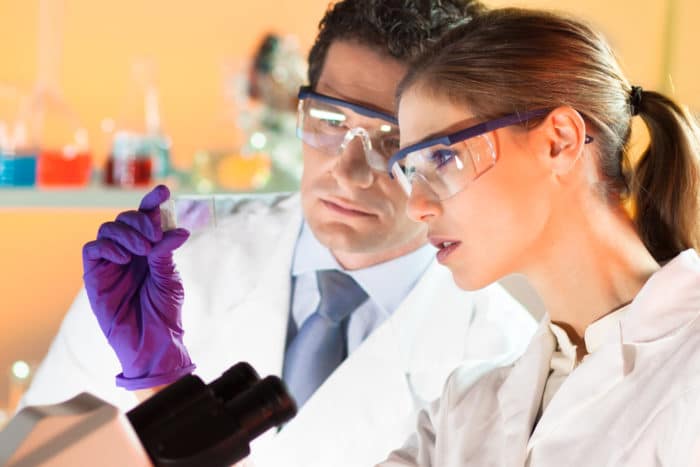Why We Love It
-
$93,730Potential Avg. Salary
-
8.2%Job Growth Rate
-
Growing DemandJob Outlook
-
Growing IndustryCareer Attribute
Serologists research fluids found in the human body, such as blood and saliva. Applied serologists often work in forensic science where they assist in criminal investigations by analyzing blood, urine, saliva, semen and other bodily fluids found at crime scenes. Their work can identify possible suspects, determine cause of death and help detectives unravel the sequence of events surrounding a crime.
Recommended Schools
What is a Serologist?
Most forensic serologists work for law enforcement agencies, at the federal, state and local levels. They usually work a standard 40-hour week, but may work overtime if the lab has an exceptionally high case load.
Serologists typically fulfill the following duties:
- Plan and direct studies to investigate human or animal disease, preventive methods, and treatments for disease.
- Conduct research to develop methodologies, instrumentation, and procedures for medical application, analyzing data and presenting findings to the scientific audience and general public.
- Study animal and human health and physiological processes.
- Follow strict safety procedures when handling toxic materials to avoid contamination.
- Write and publish articles in scientific journals.
Most spend their entire day in the crime lab, though some may occasionally visit crime scenes to collect evidence. Serologists who work in the field may encounter environmental hazards such as extreme weather and unsanitary conditions. They must also watch for broken glass, weapons, potentially dangerous substances and other risks related to the crime scene. Serologists based at the crime lab benefit from generally safe, comfortable working conditions, though they must follow safety protocols when examining and testing bodily fluids.
Responsibilities
Forensic serologists may test samples brought to them by crime scene investigators, detectives or the medical examiner, or they may examine evidence in search of bodily fluids. Before they can analyze a sample, they must first determine if it’s viable. In some cases, there’s not enough fluid to conduct testing, or the material may be contaminated or too old to produce reliable results. Serologists examine samples under a microscope or use other equipment to test for drugs or to determine if bodily fluids found at a scene belong to a suspect. They then summarize their findings in a written report, which is reviewed by another forensic specialist and added to the case files. Forensic serologists may also be asked to testify in court regarding their findings.
Skills
While many forensic serologists spend much of their time in the lab analyzing samples, they still need strong people and communication skills. They may need to provide progress reports to their supervisors or to the detectives working on the case, and may collaborate with fellow forensic specialists. Excellent organizational skills and the ability to juggle several tasks simultaneously are also crucial, because they often work on several samples at once and must manage their time so that they complete their analysis and their written reports in a timely manner. Failing to meet deadlines could jeopardize criminal investigations.
Forensic serologists assist in criminal investigations by analyzing blood, urine, saliva, semen and other bodily fluids found at crime scenes. Their work can identify possible suspects, determine cause of death and help detectives unravel the sequence of events surrounding a crime. The U.S. Bureau of Labor Statistics notes that employment opportunities to increase by 19 percent between 2010 and 2020.
Recommended Schools
How To Become a Serologist
Forensic serologists need at least an undergraduate degree in biology, preferably with additional coursework in math and criminal investigation. Some law enforcement agencies may require advanced degrees as well, either in biology or in forensic science or criminal justice. Though not required, an internship offering hands-on experience can improve employment prospects and prepare students for full-time work. Some employers also require continuing education courses. In addition, forensic serologists can earn certification in forensic investigation or biology, though most employers don’t require this.
Serologist Salary Data
We’ve provided you the following to learn more about this career. The salary and growth data on this page comes from recently published Bureau of Labor Statistics data while the recommendations and editorial content are based on our research.
National Anual Salary
Low Range
$57,640Average
$93,730High Range
$155,180National Hourly Wage
Low Range
$28/hrAverage
$45/hrHigh Range
$75/hrHow do Serologist salaries stack up to other jobs across the country? Based on the latest jobs data nationwide, Serologist's can make an average annual salary of $93,730, or $45 per hour. On the lower end, they can make $57,640 or $28 per hour, perhaps when just starting out or based on the state you live in.
Salary Rankings And Facts
#82 Nationally for All Careers
Above Average Salary Nationally
Highest Education Among Serologists
- 61.7% Doctorate
- 28.9% Masters
- 7.5% Bachelors
- 0.5% Associates
- 0.9% College
- 0.3% High School
- 0.1% Less than High School
Job Growth Projections and Forecast
2014 Total Jobs
107,9002024 Est. Jobs
116,800Job Growth Rate
8.2%Est. New Jobs
8,900How does Serologist job growth stack up to other jobs across the country? By 2024, there will be a change of 8,900 jobs for a total of 116,800 people employed in the career nationwide. This is a 8.2% change in growth over the next ten years, giving the career a growth rate nationwide of Above Average.
Growth Rankings And Facts
#268 Nationally for All Careers
Above Avg. Growth Nationally
What Companies Employ The Most Serologists
| Industry | Current Jobs | New Jobs Needed | % Increase |
|---|---|---|---|
| Research and development in the physical, engineering, and life sciences | 37,100 | 2,500 | 3% |
| Colleges, universities, and professional schools; state | 19,400 | 800 | 1% |
| General medical and surgical hospitals; private | 10,700 | 800 | 1% |













